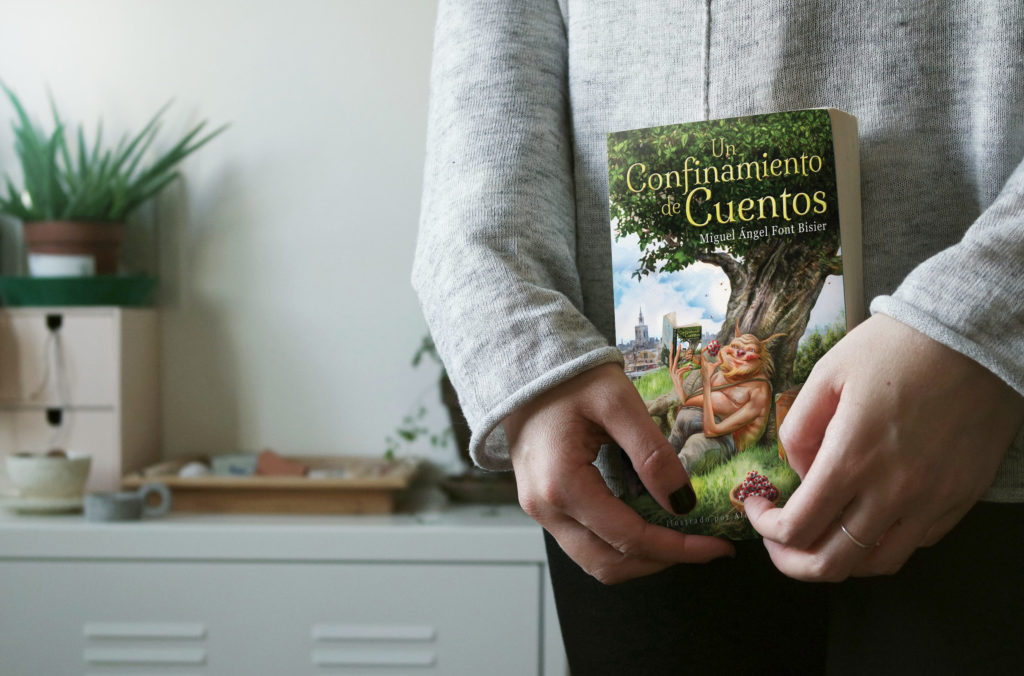Inclusion, fantasy and coronavirus
Un confinamiento de cuentos (Stories of a lockdown), by Miguel Ángel Font Bisier, is a multimedia book accessible to everyone now available for purchase in multiple formats and platforms.
The book is an anthology of short stories written over the first three months of the Spanish COVID-19 lockdown (March – May 2020). Combining fantasy and matters of the daily life, in a fresh and humorous style, the author reflects on the COVID-19 pandemic from different angles: love, friendship, the fear of loneliness, the arts, the grief…
According to the author, a story is:
a miniature in text form that, I have discovered, works best when the audience takes part. When they use their own voice, like a good meal feels incomplete without the following conversation.
One might even say that a story is much more than a literary work. It is an exercise of communication, dialogue and constant learning. For that reason, when the Spanish Government declared the state of alarm on March 14, I thought about the value of stories and tales, as they can be a balm to the loss of freedom.
COVID-19 has made an impact on each and every one of the pillars upon which the welfare state was built.
For the author, a certain responsibility is required to discuss about coronavirus.
Many families were hit hard by the consequences of the pandemic.
In this book you will not find a single hint of irreverence, controversy/polemic nor ideological agenda.
In this regard, in Un confinamiento de cuentos, diversity and fantasy have been woven in parallel, with delicate intimacy, to offer a safe space for readers to share their lived experiences over the year 2020.
A mysterious, but well-structured book
Un confinamiento de cuentos is an anthology of 14 stories grouped under the following sections:
- Convivencia (Coexistence)
- Deseos y miedos (Desire and fear)
- Perspectivas (Perspectives)
- Nuestra existencia (Our existence)
- Los cuentos nunca dicen «adiós» (Stories that never say «bye bye»)
Even though each story is independent and self-conclusive, they all share a thematic thread to create a unique structure. Apart from that special element, each episode includes a haiku, a form of Japanese poetry consisting of 17 syllables arranged in three lines of five, seven and five syllables consecutively.

A book with audio-visual secrets
Un confinamiento de cuentos includes more than 41 minutes of video. Throughout its pages, the book provides the reader ten QR codes with different audio-visual contents. Audio-stories, stories in English, original songs, a tale in Sign Language…
All the video are accessible: subtitles available for deaf people, immersive sound effects and narration, like a creative audiodescription.
A read-aloud book
Behind this special feature, there is a story of friendship. Vicente Alcoy, a regular contributor to the author Miguel Ángel, has been one of the main supporters in the revision of the book. Owing to Vicente’s difficulties with eyesight, Miguel Ángel read the book out loud over the phone to him.
For that reason, the text has a really special musicality. This fact is a special opportunity for the reader to become a storyteller and transmit that to the audience: Friends, students over twelve years old, family, couples and much more, so they can all share points of view.
You may purchase the digital accessible version Un confinamiento de cuentos through the following link.
An illustrated book
As an easter egg to every story, Alejandro Colucci, a well-known illustrator and cover designer who was born in Uruguay, has created 37 illustrations for the book.
His drawings can be divided into two groups: the first one consists of little icons to open each of the stories as clues. The second group is composed of full page illustrations which sum up the essence of each story.
In the case of any barrier complicating the virtual Access to the images, Miguel Ángel has designed a unique section at the end of the book to break those barriers for his audience. It is entitled «Trazos en palabras» (strokes in words) and it describes, one at a time, each of the illustrations and drawings included in Un confinamiento de cuentos. Also, it describes the individual style the artist, Alejandro, uses to perform his work.
A book for dialogue
In the words of its author,
While writing the book has been a creative work, it has also had self-therapeutic effects. Understanding the post-Covid-19 world is a very difficult take so, in the stories, I have tried to explain my doubts, my weaknesses, my fears, but without hope being ignored. Because there is always, and I repeat always, sunshine behind the clouds.
To highlight this, after every story the reader will find a section entitled:
«Te invitamos a reflexionar» (we invite you for reflection).
This report has been written by Aroa Fernández, Beatriz Marín and Mamen Garrido, a team of psychologists and personal growth experts. They provide a counterpoint to every story, the teaching section, posing questions and remarks that enable fantasy to be linked to the human side of the stories.
At the end of these analyses, Aroa, Bea and Mamen have included a final section: «Si quieres pasar a la acción» (if you want to take action). On it, they have set challenges and exercises that, nicely and kindly, invite the reader to leave the comfort zone for a second so she/he can explore a more intimate and deeper part.
Conclusion: the book is listening to you

The sum of the sections and the stories show a clear intention of the author Miguel Ángel Font to offer, not only a perspective of his life experience and feelings during the lockdown, but also a teaching methodology to immerse ourselves in the book. Based on a highly organised and clear structure, this book is a fantastic option for teachers and therapists to have some fresh and full of life materials for their lessons and sessions.
You can get a Premium printed edition by writing an e-mail to:
info@libreriaelcresol.com
The international printed edition is also available in Amazon.
Text translator: Carmen Ibáñez.








